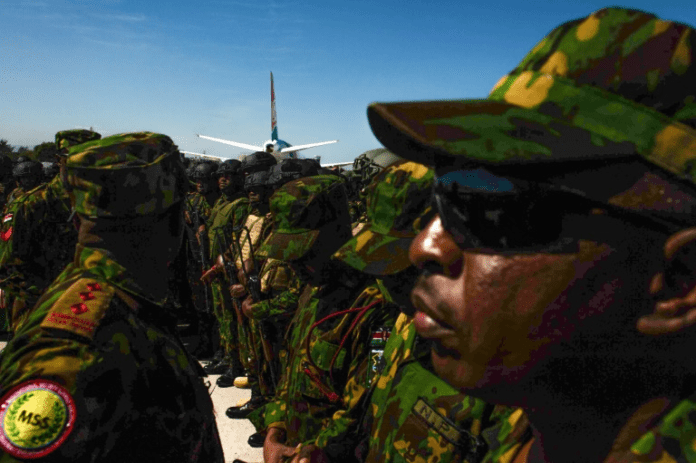
The United States has frozen more than $13 million (Ksh1.7 billion) in funding for the Kenya-led multinational security mission in Haiti, the United Nations confirmed on Tuesday. The freeze follows President Donald Trump’s executive order suspending foreign aid for 90 days as part of his administration’s broader policy review.
“The US had committed $15 million to the trust fund; $1.7 million of that had already been spent, so $13.3 million is now frozen,” UN spokesperson Stephane Dujarric told reporters.
“We received an official notification from the US asking for an immediate stop work order on their contribution.”
The Kenya-led mission, deployed to restore order in gang-controlled Port-au-Prince, was approved by the UN Security Council but is not a UN operation. It relies on voluntary contributions, which remain limited. So far, $110 million has been deposited into the UN trust fund supporting the mission, with Canada contributing over half of the total amount.
Despite initial momentum, the mission is facing severe financial and logistical challenges. It is operating with only a fraction of the planned 2,500 security personnel and remains underequipped.
On Tuesday, 70 Salvadoran soldiers arrived in Port-au-Prince, but they are not combat troops. Instead, they are aviation specialists deployed to handle medical evacuations, a role previously carried out by US and Dominican military aircraft.
Meanwhile, Haitian gangs, armed largely with weapons trafficked from the United States, have formed a common alliance, expanding their influence beyond the capital.
The funding freeze is part of Trump’s broader reassessment of foreign assistance, aimed at ensuring aid aligns with his “America First” policy. The executive order, signed hours after his inauguration last month, has affected security initiatives, health programs, and humanitarian efforts worldwide.
In Haiti, the US is the largest donor, and the funding halt has disrupted critical services. Clinics providing HIV/AIDS treatment have suspended operations, and security advisers assisting both the Haitian National Police and the Kenyan-led mission have been laid off, according to the Miami Herald.
During his Senate confirmation hearing, US Secretary of State Marco Rubio acknowledged Kenya’s role in leading the Haiti mission and expressed gratitude. However, neither Trump nor Rubio has confirmed whether the US will continue funding the operation.
Under former President Joe Biden, Washington had committed over $620 million for Haiti’s stabilization efforts. However, the Trump administration has not clarified whether it will honor that commitment.
Adding to the uncertainty, the administration has not indicated whether it will support a proposal—championed by Biden—to transition the mission into a formal UN peacekeeping operation. Such a move would require approval from the UN Security Council, including Russia and China.
Before leaving office, Biden officials reportedly warned Haitian leaders that mission funding could run out by March unless additional support was secured. The Pentagon had identified an extra $120 million for Haiti, but it remains unclear whether those funds were disbursed before Biden’s departure.
With critical funding frozen and no clear direction from Washington, the Kenya-led security mission in Haiti faces an uncertain future, caught between geopolitical shifts and the Trump administration’s recalibrated foreign policy priorities.






